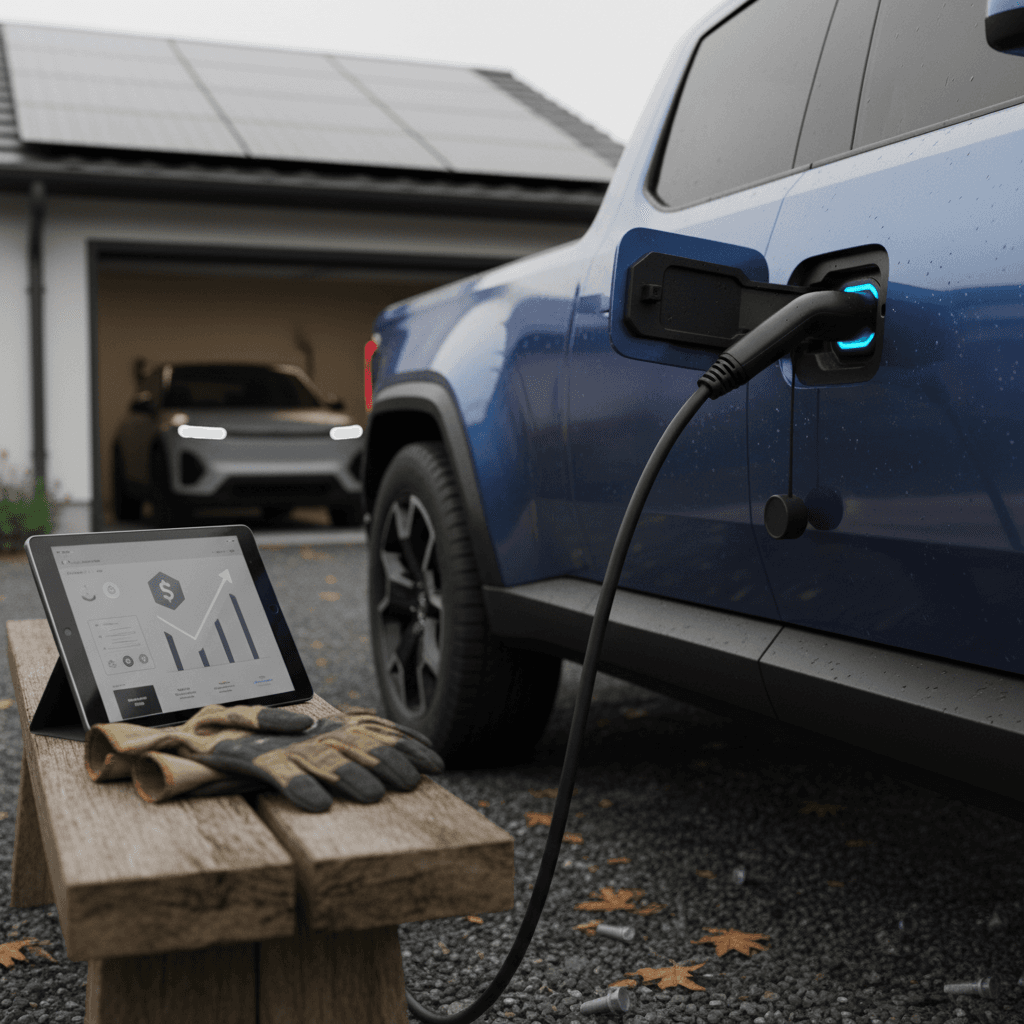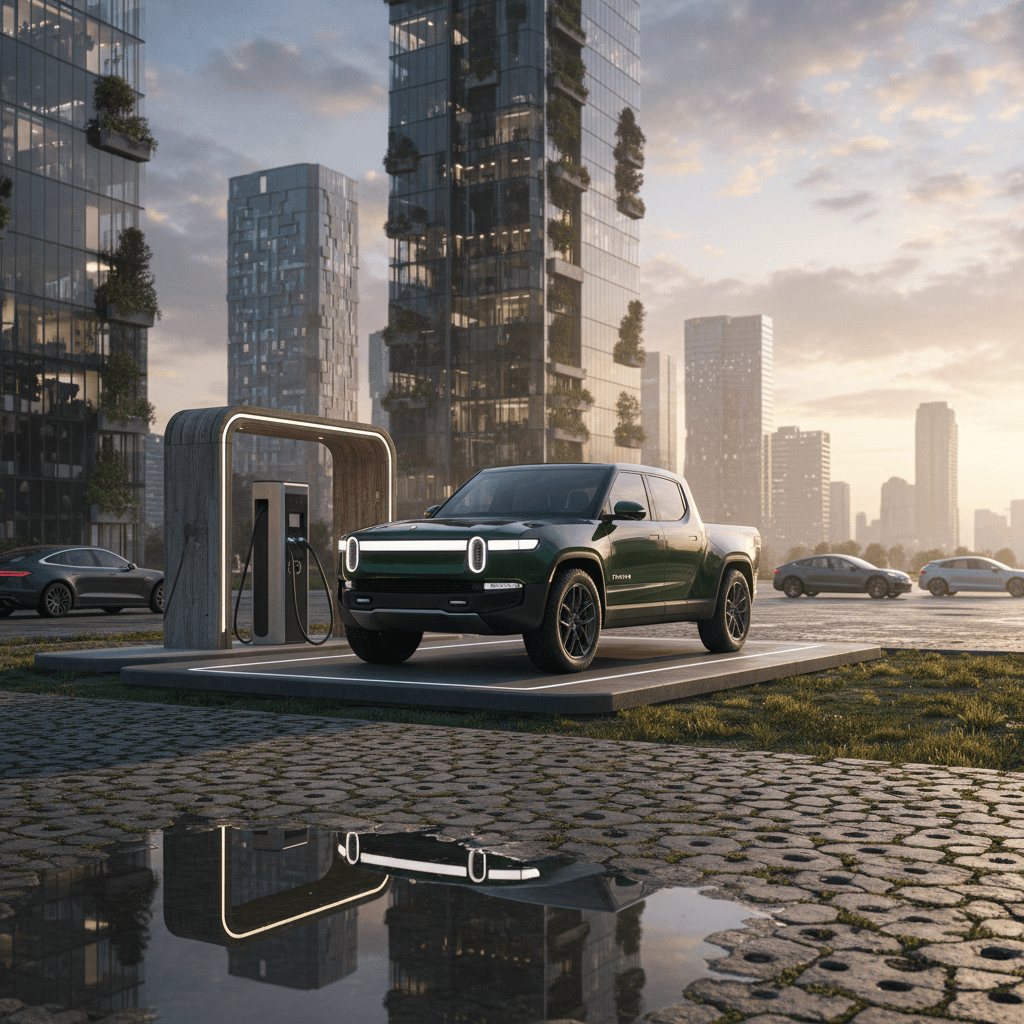Type “evcompany” into a search bar in 2025 and you’re really asking a bigger question: which electric vehicle company should I trust with tens of thousands of dollars, and maybe my only car? Between Tesla, BYD, Hyundai–Kia, Ford, Rivian, Lucid, and a swarm of startups and used EV marketplaces, the choice feels less like shopping and more like speed-dating with engineers.
Quick Take
What People Really Mean by “EVCompany”
In everyday conversation, “evcompany” has become shorthand for three different things: 1. The brand that built the car (Tesla, BYD, Hyundai, Ford, Rivian, Lucid, etc.) 2. The ecosystem behind it (charging network, apps, software updates, warranties) 3. The place you actually buy from (a dealer, direct from the manufacturer, or a dedicated used EV marketplace like Recharged). If you don’t separate those ideas, you end up comparing apples to charging stations. So in this guide, when we say EV company, we’ll be clear whether we mean automaker, ecosystem, or retailer/marketplace.

The EV Company Landscape in 2025
EV Companies in a Market That Won’t Slow Down
Behind those big numbers is a reshuffling of who counts as a serious EV company.
- Tesla is still the benchmark in mindshare, but its U.S. market share is slipping as other brands finally show up with credible EVs.
- Chinese giants like BYD dominate volume globally and are creeping into Western markets.
- Legacy automakers, Hyundai–Kia, GM, Ford, VW, Mercedes, BMW, now sell EVs that can realistically compete on range and tech.
- Startups like Rivian and Lucid are still small in volume but big in brand identity.
Four Types of EV Companies You’ll Meet
The Four EVCompany Archetypes
Every brand or marketplace you’re considering fits one of these buckets
1. Pure-Play EV Makers
These are companies whose identity begins and ends with electric: Tesla, BYD, Rivian, Lucid, Polestar.
- ⚡ Usually strong on software and charging experience
- 📱 Feature-rich apps and OTA updates
- 🧪 More willing to experiment with new tech
Upside: cohesive EV experience. Risk: young brands can change direction, or valuations, overnight.
2. Legacy Automakers Going Electric
Hyundai–Kia, Ford, GM, VW, Mercedes, BMW, Toyota and others are now serious about EVs.
- 🏭 Deep manufacturing experience and dealer/service networks
- 🧩 Often juggle gas, hybrid, and EV strategies at once
- 💳 Traditional rebates, leasing, and incentives
Upside: stability and service coverage. Risk: product-planning tug-of-war between old and new tech.
3. Dealerships & Direct-Sales Retailers
This is where you physically or digitally get the car:
- 🏢 Franchise dealers for most legacy brands
- 🖥️ Direct online sales for Tesla and some startups
- 🛒 Large used-car chains dabbling in EVs
Here, the ‘evcompany’ is whoever owns the customer experience, not the logo on the hood.
4. EV-Focused Marketplaces & Service Platforms
These companies don’t build cars, they make EV ownership easier. Think Recharged for used EVs, charging-network operators, battery-health diagnostics, and financing platforms.
- 🔍 Specialization in EV-specific risks like battery health
- 📊 Data-driven pricing and condition reports
- 🚚 Digital purchase, delivery, and trade-in options
Upside: expertise and transparency. Risk: you still rely on the underlying automaker for future software and hardware support.
How to Use These Buckets
How to Compare One EV Company Against Another
Sticker price and 0–60 times make for great YouTube thumbnails, but the real difference between EV companies shows up in year three, on a cold Tuesday, when something goes wrong. Here’s how to make a grown-up comparison.
1. Product & Battery Tech
- Battery size & efficiency: How many miles per kWh? A 77 kWh pack that’s thirsty is no bargain.
- Thermal management: Liquid-cooled packs age better than air-cooled in most climates.
- Warranty: Most serious EV companies offer 8 yrs/100k+ miles on the battery. Anything less, ask why.
- Degradation track record: Search owner forums for real-world reports, not just brochure numbers.
2. Charging & Software Ecosystem
- Fast-charging access: Does the brand support NACS, CCS, or both, and what networks can you actually use?
- App quality: Can you plan trips, precondition, and schedule charging reliably from your phone?
- Over-the-air updates: Do updates meaningfully improve range, UI, or features, or just add new subscription prompts?
- Home charging support: Is there clear guidance or a recommended installer network?
3. Ownership Experience
- Service network: How far is the nearest EV-trained service center?
- Loaner & mobile service: Some EV companies bring the tech to you; others book you six weeks out.
- Transparency on battery health: Can you get a credible state-of-health reading before you buy, especially used?
- Resale values: Look at three-to-five-year depreciation. A cheap new EV can become an expensive mistake if resale collapses.
4. Values & Long-Term Viability
- Financial health: Is this company likely to still exist, and support your car, ten years from now?
- Recall and update behavior: Do they quietly fix issues or pretend nothing’s wrong?
- Customer communication: Are they present and honest when incentives change, software glitches, or chargers go down?
- Sustainability claims vs. reality: Scrutinize how they talk about batteries, sourcing, and recycling.
Beware the Spec-Sheet Mirage
Should You Buy New From an EV Company or Used From a Marketplace?
Another hidden meaning of evcompany is “should I go straight to the manufacturer, or buy from someone who specializes in used EVs?” Both paths can be smart; they just solve different problems.
New EV From Manufacturer vs Used EV From Specialist Marketplace
How buying straight from an EV company compares with buying from a used EV platform like Recharged.
| Factor | New From Automaker/Dealer | Used From EV Marketplace (e.g., Recharged) |
|---|---|---|
| Upfront Price | Highest, but access to latest tech and incentives | Lower, often 20–40% off original MSRP for a 2–4 year old EV |
| Battery Risk | Unknown long-term health, but full new-battery warranty | Some degradation already visible, but can be measured and priced in |
| Choice | Limited by current model lineup and allocation | Mix of brands, trims, and model years in one place |
| Transparency | Window stickers, Carfax, but often no detailed battery data | Dedicated battery health reports like the Recharged Score plus history and pricing analysis |
| Buying Experience | Traditional dealer tactics or single-brand direct sales | Fully digital experience, EV-specialist advisors, home delivery |
| Financing & Trade-In | Conventional loans, sometimes brand-subsidized; trade-in offers vary | EV-aware lenders, trade-in or instant offer workflows optimized for electrics |
The right choice depends less on model-year bragging rights and more on how much risk you’re comfortable carrying yourself.

Where Recharged Fits
Why a Used EV Company Like Recharged Matters
By 2025, the first big wave of EVs sold in the early-2020s is hitting the used market in force. That’s fantastic news for pricing, and dangerous news if no one is checking the batteries. A dedicated used EV company exists to sit between the original automaker and you, translating chemistry into plain language.
What a Specialist Used EVCompany Brings to the Table
Why you might want a marketplace like Recharged in your corner
1. Battery Health, Demystified
Every EV on Recharged comes with a Recharged Score Report that includes verified battery health diagnostics, not just a guess based on age and miles.
Instead of hoping the range estimator is honest, you see how the pack is actually performing and how that impacts fair market value.
2. Fair, Data-Driven Pricing
Because Recharged only deals in EVs, it can price cars based on battery health, real-world demand, and incentives, not just auction folklore.
You’re less likely to overpay for a tired pack, or walk away from a great car because the odometer scared you.
3. EV-Specialist Support
From “Which connector do I need on road trips?” to “Can my panel handle a Level 2 charger?”, Recharged connects you with EV specialists, not generalists.
They’ll walk you through financing, trade-ins, and charging without the usual dealership arm-wrestling.
Digital First, But Not Alone
Checklist: 9 Questions to Ask Any EV Company
Essential Questions Before You Sign Anything
1. How do you measure and disclose battery health?
If the answer is “we don’t” or “we just look at range,” that’s a red flag. You want a clear method and a report you can keep, like the Recharged Score on used EVs.
2. What exactly is covered under the battery and drivetrain warranty?
Get the years, mileage, and exclusions in writing. Ask what happens if range drops significantly but the pack doesn’t outright fail.
3. Which fast-charging standards does this EV support today?
Ask about NACS vs CCS, any included adapters, and which networks the company officially supports. Future promises are nice; working chargers today are better.
4. How many EV-trained service centers are within 50–100 miles of me?
A bargain EV isn’t a bargain if the nearest qualified technician lives on a different time zone.
5. Do you offer at-home charger guidance or installation support?
The best EV companies help you solve Level 2 charging, either with recommended hardware, installers, or clear documentation.
6. How do software updates work, and what do they cost?
Are updates free and meaningful, or are they primarily new paid features? Does the company ever remove features or throttle performance?
7. What tools do you give me to plan road trips and manage charging costs?
Look for in-car route planning, charging cost estimates, and app integrations that make long drives and off-peak charging easier.
8. How do you handle trade-ins or selling the car later?
New or used, you should know your exit options. Recharged, for example, offers trade-in and instant offer paths specifically tuned for EVs.
9. Who picks up the phone when something goes wrong?
Is there 24/7 roadside support? A human chat? Or just an FAQ page and good luck? Ownership anxiety drops sharply when support is clear.
Common Pitfalls When Choosing an EV Company
- Chasing the lowest payment without checking battery health, charging access, or service coverage.
- Assuming all EV warranties are identical; some exclude meaningful degradation until the car is nearly unusable.
- Buying from a generalist used-car lot with no EV expertise, then discovering you’re the guinea pig when something breaks.
- Falling in love with a startup’s design without asking how they’ll support parts, software, and resale value long term.
- Ignoring used EV options altogether, even when a lightly used car from a solid brand solves your budget and range needs.
The Silent Killer: Unknown Battery Health
EVCompany FAQs
Frequently Asked EVCompany Questions
The Bottom Line: Pick the Company That Fits Your Life
In a world where “evcompany” can mean Tesla, BYD, Hyundai, a local dealer, or a specialist marketplace like Recharged, the real question isn’t “Who’s number one?” It’s “Who’s going to make my next ten years with this car transparent, affordable, and low-drama?”
If you want the newest tech and are comfortable betting on a single brand’s ecosystem, a pure-play automaker might be your match. If you value stability and service coverage, a legacy brand could be the safer call. And if you want maximum value with minimum battery guesswork, a used EV company built around verified battery health, fair pricing, EV-savvy financing, and guided support, exactly what Recharged was built to do, may be the most rational choice of all.

